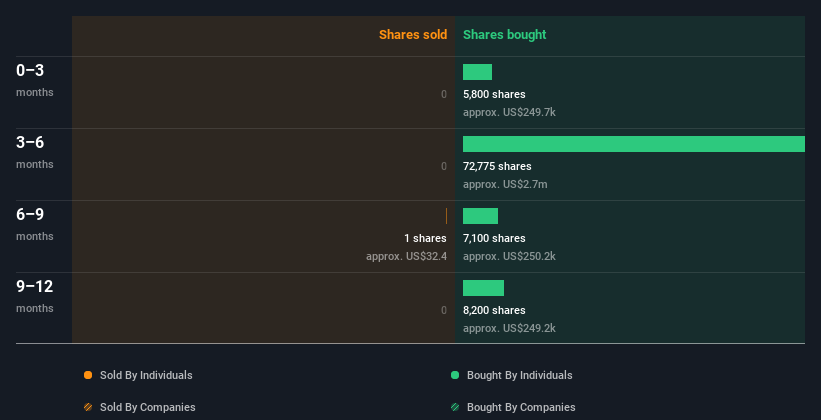Intel Insiders Placed Bullish Bets Worth US$3.50m
Multiple insiders secured a larger position in Intel Corporation (NASDAQ:INTC) shares over the last 12 months. This is reassuring as this suggests that insiders have increased optimism about the company's prospects.
While we would never suggest that investors should base their decisions solely on what the directors of a company have been doing, logic dictates you should pay some attention to whether insiders are buying or selling shares.
See our latest analysis for Intel
The Last 12 Months Of Insider Transactions At Intel
In the last twelve months, the biggest single purchase by an insider was when insider Lip-Bu Tan bought US$2.5m worth of shares at a price of US$37.92 per share. So it's clear an insider wanted to buy, even at a higher price than the current share price (being US$35.69). It's very possible they regret the purchase, but it's more likely they are bullish about the company. To us, it's very important to consider the price insiders pay for shares. As a general rule, we feel more positive about a stock if insiders have bought shares at above current prices, because that suggests they viewed the stock as good value, even at a higher price.
In the last twelve months insiders purchased 93.88k shares for US$3.5m. But they sold 1.00 shares for US$32.4. In total, Intel insiders bought more than they sold over the last year. You can see a visual depiction of insider transactions (by companies and individuals) over the last 12 months, below. By clicking on the graph below, you can see the precise details of each insider transaction!
Intel is not the only stock insiders are buying. So take a peek at this free list of growing companies with insider buying.
Insiders At Intel Have Bought Stock Recently
Over the last three months, we've seen significant insider buying at Intel. Specifically, CEO & Director Patrick Gelsinger bought US$250k worth of shares in that time, and we didn't record any sales whatsoever. This makes one think the business has some good points.
Insider Ownership Of Intel
Another way to test the alignment between the leaders of a company and other shareholders is to look at how many shares they own. A high insider ownership often makes company leadership more mindful of shareholder interests. Intel insiders own about US$79m worth of shares. That equates to 0.05% of the company. We've certainly seen higher levels of insider ownership elsewhere, but these holdings are enough to suggest alignment between insiders and the other shareholders.
What Might The Insider Transactions At Intel Tell Us?
It's certainly positive to see the recent insider purchase. We also take confidence from the longer term picture of insider transactions. Insiders likely see value in Intel shares, given these transactions (along with notable insider ownership of the company). While we like knowing what's going on with the insider's ownership and transactions, we make sure to also consider what risks are facing a stock before making any investment decision. In terms of investment risks, we've identified 2 warning signs with Intel and understanding them should be part of your investment process.
Of course, you might find a fantastic investment by looking elsewhere. So take a peek at this free list of interesting companies.
For the purposes of this article, insiders are those individuals who report their transactions to the relevant regulatory body. We currently account for open market transactions and private dispositions of direct interests only, but not derivative transactions or indirect interests.
Have feedback on this article? Concerned about the content? Get in touch with us directly. Alternatively, email editorial-team (at) simplywallst.com.
This article by Simply Wall St is general in nature. We provide commentary based on historical data and analyst forecasts only using an unbiased methodology and our articles are not intended to be financial advice. It does not constitute a recommendation to buy or sell any stock, and does not take account of your objectives, or your financial situation. We aim to bring you long-term focused analysis driven by fundamental data. Note that our analysis may not factor in the latest price-sensitive company announcements or qualitative material. Simply Wall St has no position in any stocks mentioned.

 Yahoo Finance
Yahoo Finance 
